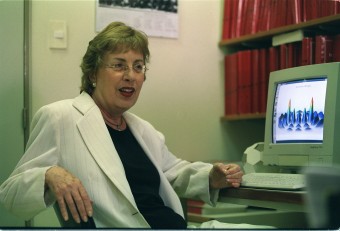Personal tools
News from ICTP 109 - Profile

Mariana Weissmann, winner of the 2003 L'Oréal Prize for Women in Science and frequent visitor to ICTP, has been at the forefront of computational physics in Latin America for the past several decades.
Full Measure of Success

As a graduate student at the
University of Buenos Aires in the early 1960s, Mariana Weissmann
did her first calculations on a manual calculator. Today, she
relies on her desktop computer or turns to a university-based
mega-computer whose calculations are driven by 48 high-powered
processors.
"At one point we carried punch cards from one building to
the next," Weissmann says. "Now we carry memory sticks
on airplanes. Our tools have indeed changed over time."
But these new and improved tools haven't altered the constants
that truly account for her achievements. Intelligence, imagination,
hard work and enthusiasm have been the hallmarks of her success.
Weissmann, who received the 2003 L'Oréal Prize for Women
in Science, is one of Latin America's foremost computational physicists.
She has applied her skills to such diverse fields as theoretical
chemistry, where she examined hydrogen bonds and the structure
of liquid water; atomic physics, where she focused on the molecular
dynamics of small systems; and solid state physics, where she
applied complex computer techniques to explore the structure of
materials.
"For some time now," notes Weissmann, "my research
has focused on non-periodic solids, disordered materials, and
superlattices. More recently, I have studied the diffusion of
impurities over surfaces and magnetic metallic wires."
"New high-powered computational tools," explains Weissmann,
"mean that time once spent on programming is now available
to think about new physics problems and their solutions. We used
to write our own computer codes but, due to increasing machine
capabilities, codes have become too complicated for scientists
to do on their own. As a result, we rely on codes that have been
developed by others, such as those devised by Roberto Car and
Michele Parrinello, both of whom are well known in the Trieste
science community." (see "Models of Behaviour," News from ICTP,
Autumn 2003, p. 14.)
Like Car and Parrinello, Weissmann is also one of the more illustrious
members of ICTP's extended family of scientists. From 1985 to
1995 she was an ICTP Associate. Over the course of her career,
she has visited the Miramare campus on numerous occasions with
her last visit taking place in 1998 to participate in a workshop
focusing on the ab-initio method, a computer program that
calculates all relevant properties of electrons and atoms in solids.
"ICTP has played an important role in my career," says
Weissmann. "As an ICTP Associate I was able to travel to
Europe several times, meet physicists from different places and
go to international conferences at a time when the price of an
airplane ticket from Argentina to Europe or the United States
would have equalled my entire year's salary."
"ICTP," she adds, "has also played an important
role in the education of my graduate students who have attended
the Centre's spring colleges in condensed matter physics, learning
many things we could not teach them in Argentina."
Weissmann acknowledges that the economic crisis that first struck
Argentina in 2001 has jolted the entire nation, including its
scientific community. It was not the first time that the scientific
community in Argentina was dramatically affected by events beyond
its control. Indeed economic crises in 1966, 1974 and 1976 had
a similar impact.
"Tough times," she notes, "have caused many professors
to look for jobs elsewhere." This response, she adds, should
come as no surprise. "Many of our scientists are first-generation
Argentineans--their parents having migrated here from Europe.
Much of their university education has taken place in foreign
countries. They are used to moving from one place to another and
they adapt easily to new surroundings. Poor pay and inadequate
working conditions in Argentina make it difficult for them to
develop a close attachment to their jobs at home. So if a better
opportunity arises, chances are they will not pass it up."
Weissmann is quick to add that Argentina may be among the best
places in the world for women to work--at least when it comes
to issues of gender equality and respect. "The problem here
is not the status of women but the status of science. Indeed if
salaries and working conditions do not improve, it is conceivable
that science in Argentina could be completely feminised--much
like the field of primary and secondary education."
Weissmann concedes that "as long as foreign countries lure
our graduates away with higher salaries and better working conditions,
Argentina will continue to export many of its most highly skilled
workers without receiving much in return." She observes,
however, "that this may not be all bad since it allows talented
people to receive a good scientific education here--something
that does not happen in many other developing countries."
Another potential benefit is that some scientists may actually
return home to pursue their careers, achieving a 'full measure
of success' comparable to the one that Weissmann herself has achieved.
As her career shows, competitive research and good scientific
teaching are possible in a third world country.